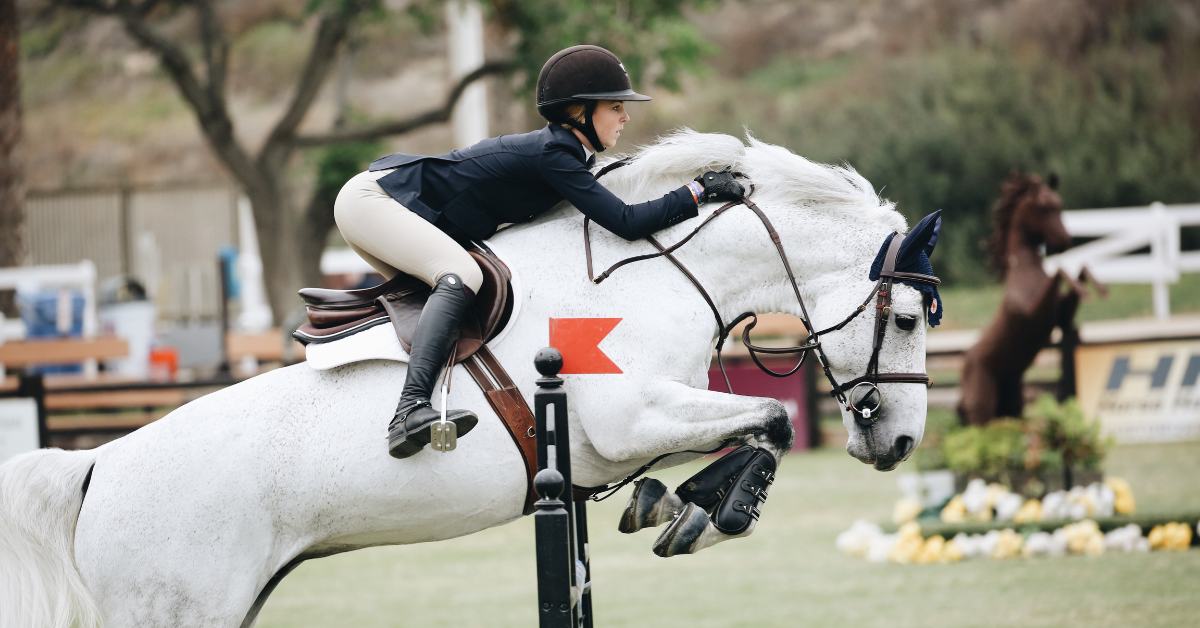What influence do you have on your horse's competition stress?
When we go to competition with our horse, we go out of our comfort zone. Not only the comfort zone of the horse, who suddenly has to perform in a strange ring with strange noises and other horses, but also out of our own comfort zone. How does your stress affect your horse's stress level?
Stress

26 May '25 • 3 min reading time
A story from the practice of a physiotherapist who works with the Flexchair: “I once had a row of Flexchairs set up during a demonstration, with a group of focused riders doing exercises to improve their balance and mobility.” A Flexchair is a type of saddle connected to a computer. On the screen, you see a ball that you have to keep within a specific shape – for example, moving it left to right along a horizontal bar. You do this by shifting the saddle using your seat. The physiotherapist: “I quietly stood behind the group and suddenly called out: ‘Enter at A-X-C in working trot!’ On all the screens, the balls flew all over the place, far outside the designated patterns. It was a huge eye-opener for everyone!”
Ambition, Stress, and Expectations
As this physiotherapist’s experience clearly shows: something changes in you as a rider the moment you enter the arena. Even if you're just doing a practice round or have a lot of trust in your horse, simply wanting to do your best can already alter the way you sit. Not to mention what happens when you’re already thinking beforehand that your horse won’t go past that scary judge’s booth. Horses respond intuitively to what’s happening in the saddle and around them. So if you’re feeling stress, healthy tension, the will to win, or nervousness about the audience or other riders – your horse feels that. You unconsciously send signals to your horse through your breathing, your legs, your hands, and your seat.
Prey Animal
Even knowing how it works doesn’t always make it easier to prevent your horse from picking up on your tension. Especially because your horse is already extra alert in an unfamiliar competition environment. As a prey animal, your horse has a keen radar for anything out of the ordinary. It’s already on the lookout for danger in a strange setting and needs reassurance from you that everything is fine. But if you’re behaving differently than usual, that actually confirms for the horse that something is wrong. This can lead to refusal, flight behavior, or ignoring your aids.
Creating Awareness
So be aware of your role. Keep breathing normally. Don’t start chatting loudly or extensively while riding. Don’t clamp with your legs or tense your pelvis. Warm up in the same way you do at home. Reassure your horse and reward him when he relaxes, even just a little. Riding a competition with your horse is really different from running or cycling a race. It’s not about you. Remember that your job is to make the experience pleasant for your horse. Only once that’s achieved can you think about performance. It also helps to set realistic goals. If you're entering the ring for the first time with a young horse, a good goal might be: “Stay within the arena in the first test and complete all exercises in the second.” A specific score or winning placement isn’t realistic at the early stages of competition. Focus on what you can control: your own behavior, preparation, and expectations.
Supporting with Stress
When horses experience a lot of stress in unfamiliar environments, you can help build their resilience through groundwork and desensitization training. In addition, a herbal supplement containing chamomile and passionflower can help the horse process stress more quickly. You should give such a supplement as a short course starting two days before the competition. Make sure any calming supplement is doping-free and does not contain, for example, valerian!


.png)